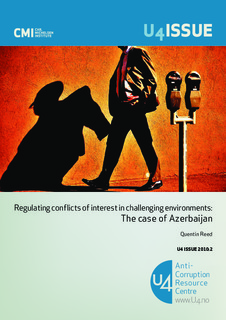| dc.contributor.author | Reed, Quentin | |
| dc.date.accessioned | 2018-01-04T08:16:30Z | |
| dc.date.available | 2018-01-04T08:16:30Z | |
| dc.date.issued | 2010-02-02 | |
| dc.identifier | oai:www.cmi.no:3622 | |
| dc.identifier.citation | Bergen: Chr. Michelsen Institute (U4 Issue 2010:2) 17 p. | |
| dc.identifier.uri | http://hdl.handle.net/11250/2474637 | |
| dc.description.abstract | Current approaches to regulating conflicts of interest, often encouraged by international anti-corruption standards, are commonly judged by how restrictive they are. Such interpretations reflect a mistaken view that a conflict of interest itself is corruption. This paper critiques current treatment of conflict of interest regulation through the lens of experience from Azerbaijan. It concludes by suggesting how the implementation and evaluation of compliance with international standards might be modified to encourage more meaningful ethical regulation, especially in difficult contexts: by prioritising standards, achieving the right balance in the types of regulation enacted, and encouraging partial rather than across-the-board regulation. | |
| dc.language.iso | eng | |
| dc.publisher | Chr. Michelsen Institute | |
| dc.relation | U4 Issue | |
| dc.relation | 2010:2 | |
| dc.relation.ispartof | U4 Issue | |
| dc.relation.ispartofseries | U4 Issue 2010:2 | |
| dc.relation.uri | https://www.cmi.no/publications/3622-regulating-conflicts-of-interest-in-challenging | |
| dc.subject | Political Corruption | |
| dc.subject | Azerbaijan | |
| dc.title | Regulating conflicts of interest in challenging environments: The case of Azerbaijan | |
| dc.type | Research report | |
